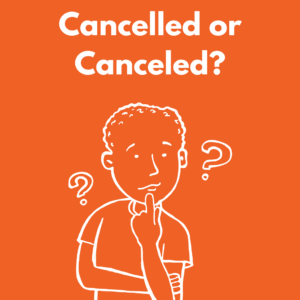"Cancelled" is the strongly preferred spelling in British English, and "canceled" is the slightly preferred spelling in American English.
You’re probably seeing the word “canceled” a lot right now, but should it be spelled with one L or two?
Well, it depends on where you live. “Canceled” with one L is more common in American English, and “cancelled” with two L’s is more common in British English, but these aren’t hard-and-fast rules either. A Google Ngram search of published books shows that both spellings are in use in both countries.
Is it ‘canceled’ or ‘cancelled’?
The AP Stylebook, used by many American news outlets, recommends “canceled” with one L.
“Cancelled” with two L’s is clearly the dominant form in British English, which my Canadian and Australian friends tell me is the preferred form in Canadian English and Australian English too.
I’ll add that whenever I talk about this rule, I always hear from American friends who tell me they prefer the 2-L version. I don’t make the rules; I just tell you what they are, and if you aren’t bound by a style guide, feel free to use what you want.
Noah Webster is usually credited with creating American spellings that have fewer letters than British spellings such as “color” and “flavor.” “Canceled” is the recommended spelling in a Webster’s 1898 dictionary, but this Ngram appears to show that “canceled” only overtook “cancelled” in American books in the early 1980s.
In summary, if you are writing for an American audience, spell “canceled” with one L, and if you’re writing for a British audience, spell “cancelled” with two L’s. If it bothers you that there are two spellings, blame Noah Webster.
For more on why Americans and Britons spell some words differently, see also: Why Are British English and American English Different?
Photo courtesy of Shutterstock.





